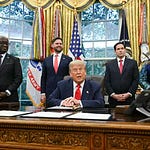Hey, it’s us! John will be in London for a while now, so you can look forward to receiving the Elephant Cage every weekday without further interruption.
Show notes:
Popular protests continue against Foreign Agents’ law
Rallies continue in Tbilisi against the Foreign Agents law, as citizens of all generations gathered again on April 21 in Tbilisi, again blocking Rustaveli avenue. Many demonstrators came with their families, representing several generations. The demonstration began with the Georgian national anthem, followed by the EU anthem, after which the demonstrators marched to the Supreme Court to demand a free and transparent judiciary.
The demonstrators chanted “Samachablo [Tskhinvali region] is Georgia!”, “Abkhazia is Georgia!”, “Yes to Europe, no to Russian law!”, “We are here to Slay, not to Obey”, “Where are we going? To Europe!”, “No to Russian law, No to Russian government, No to offshore law!”
For a full year, the bodies have piled up in Sudan—and still the world looks away:
… Even though it has been a year, there is still a sense of whiplash, of disbelief that it has actually happened, is actually happening. Every development expands the theater of war and makes a return to peace more remote. Writing these words is a halting, painful process, like stepping on shards of broken glass. Something similar plays out on an almost daily basis, where one tries, and fails, to trace and keep track of all the individual and national tolls.
And more jarring is that the world has gazed with indifference upon this crucible of war. The “forgotten war” is what it’s called now, when it’s referenced in the international media. Little is offered by way of explanation for why it is forgotten, despite the sharpness of the humanitarian situation, the security risk of the war spreading, and the fact that it has drawn in self-interested mischievous players such as the United Arab Emirates, which is supporting the RSF, and therefore extending the duration of the war.
One of the reasons for this is Gaza and the escalating Middle East conflict, and how they have monopolized global attention and diplomatic bandwidth for the past six months. And another is that for those reporting within Sudan and the few who manage to get in, doing so is difficult and fraught with danger, limiting the output of images and details that can be broadcast consistently to galvanize attention. But the rest, I suspect, is down to what to most will seem unremarkable: this is just another African country succumbing to intractable conflict.
How Mike Johnson’s faith changed his path on Ukraine:
In a letter last week, four high-profile Baptists—including Dr. Richard Land, the former president of the Southern Baptist Convention’s Ethics and Religious Liberty Commission—urged Johnson to “consider the plight of Christians” in Ukraine. Pastors there have faced threats, torture and removal from their positions by Russian forces, the letter noted.
“Despite Russian efforts to paint Ukraine as intolerant of Christians, it is the Russian government that has aggressively harmed peaceful law abiding faithful Christians in the occupied areas of Ukraine,” the letter added. “The Russian army has destroyed hundreds of Baptist churches where evangelical Christians once exercised their faith freely in Ukraine.”
Daniel Darling—who also signed the letter and directs Southwestern Baptist Theological Seminary’s center for cultural engagement—told NOTUS the group felt compelled to send it after seeing distorted narratives spread that Russia is defending Christianity. Some of Johnson’s own colleagues hold that view. Rep. Marjorie Taylor Greene, one of the speaker’s fiercest Republican opponents, said this month that Russia “is not attacking Christianity. As a matter of fact, they seem to be protecting it.”
















Share this post